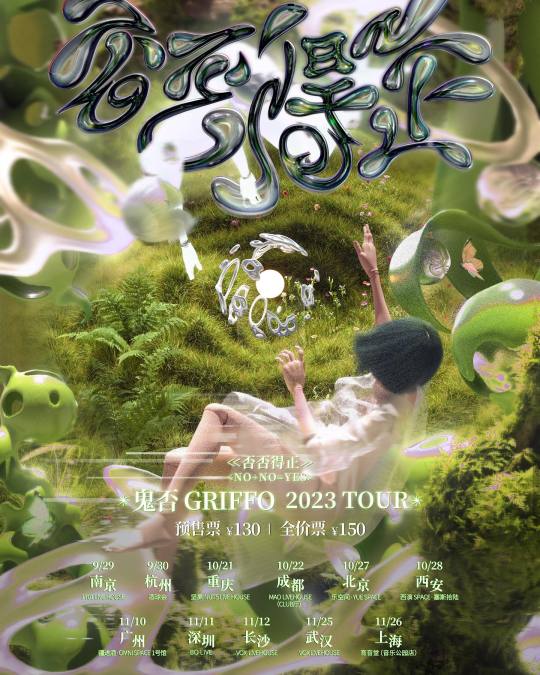#The Big Band 乐队的夏天2
Text
youtube
We just had a question about 乐队的夏天 The Big Band, so let's have a look at a clip from season 3, episode 2, featuring one of my favorite bands 鬼否 GriffO. =D
They play math-rock and are from Hangzhou, China, formed in 2014:王易玄-voc/synth (王易玄 (丸易玄) facebook, 丸易玄 Instagram), 张一杨-gtr, (also in 花招), 邓择撰-bass, 龚啸-drums
Links: GriffO (鬼否)(fb), iNDIEVOX, YouTube (王易玄), StreetVoice, douban, Spotify, new bandcamp, old bandcamp, GriffO - Topic (YT).
The clip above is on iQIYI Music 奇艺音悦台, but it is also on iQIYIVariety channel with a lot of comments. Several people disappointed that the band is not doing well in the voting. Still, being on a show like this helps raise their profile, and they are about to go on tour:

Singer 王易玄 did guest vocal for a few gigs (pics at that fb link) in China with TW guitarist/songwriter 昆蟲白 insecteens in August, here is a clip:
youtube
昆蟲白 / Insecteens Huang (黃建勳) has been a member of Miss Stocking 絲襪小姐 / 微光群島 Shimmering Islands (aka Sugar Plum Ferry甜梅號) / Frandé, 法蘭黛樂團 / Silverbus 銀巴士
Links: YouTube, Instagram, StreetVoice, Bandcamp
1 note
·
View note
Photo








沉溺于这流逝在时光里的情爱
就像游乐场中的密语, 就像是飘零在风中的尘埃
我们如此相遇 我们如此分离—“这世界已经改变我和你”
She indulges in love that passes with time
Like a secret language in an amusement park, like dust drifting in the wind
So we meet and so we separate—”This world has already changed you and me”
Zhou Shen collaborates with the Trojan Horse band to perform “Dark Star” 《她是黯淡星》 on the finale of The Big Band 《乐队的夏天》 Season 2
#zhou shen#trojan horse band#乐队的夏天#ive watched this performance so many times over the past 2 days#ITS THE VIBES SIR#and the high note at the end 😳#and like i know no one cares about this but#that controversy over singer 2020's finals about whether zhou shen really invited the new pants band as a guest or if it was a set up#either way i think he was genuinely happy to work w them#bc every single collab w a band has been a major deviation from his usual style#whether the audience likes it or not is up to them#but every time u just look at him and u can tell he's having the time of his life#tw flashing#my gifs
14 notes
·
View notes
Text
慣れない新居で、慣れることについて考える
引っ越してみた。引っ越しといえば大抵の人にとってかなり大きな決断であるだろうが、私がその決断をするときにはいくつかのチェック事項が足りていないような気がする。例えば、新居と勤務先の距離はどれぐらいか。新居の近くで食材や生活用品を揃えるにはどこに行けばいいのか。また、新居には旧居の荷物がすべて入りきるのか。新居で新たに必要となる家具は何か、など。
決断力はあるが判断力はないと言われる。今回も決断だけを先に、「あとはどうにかなるだろう、えいや」と引っ越してしまった。沖縄に引っ越した時もそんな感じだったと覚えている。職だけ決めて、あとはどうにかなるだろう、と。どうにかなってしまったから、今の自分があるというのは確かなのだけれど。
先日、初めて神戸市の新居から大阪市の職場まで行くと、その遠さに、この先が不安になった。特に退勤時刻が21時台になる遅番シフトの場合は、電車の乗り継ぎが悪く、帰宅に2時間ぐらいかかってしまう。さすがにこれは時間がかかりすぎだろうと笑ってしまった。週3日の勤務が現在コロナのおかげで1日は在宅勤務が認められているから、週2日、小旅行をするんだと思い慣れるしかない。そして、自宅内はすべての段ボールを開け終わった今でも物が溢れている。もう少し物を減らさないと、この部屋では過ごしづらそうだ。
引っ越してみると、本当に、自分という人間は、習慣で、なんとなく生きていたんだなあと実感する。いざ引っ越して、自分の周辺の物の配置が変わると、朝起きて、まずどうしていたかも思い出せないし、日々どんなルーチンをこなしていたのか、さっぱりわからない。何をすればいいかわからなくなるととりあえず、一番やったほうが良さそうな、仕事用のPCを広げてちょこちょこメールを返したりスケジュールを調整するということをやってみる。そうすると、あっという間に時間が過ぎている。時計を見ると21時25分。あれ?旧居では、毎日この時間はいったい何をしていたんだろう?
けれど、きっとこの部屋にもまもなく慣れて、だらだらと過ごせたり、また出不精になってみたりできるんだろう。ルーチンも生まれていくのかもしれない。環境が変わるたびにひどい便秘になったり頭痛を生じたりするくせに、意外と私は習慣を自分の身に寄せることも得意である。
中国福建省に留学したときには、あてがわれた寮の部屋にブーブー文句を言いながらも、最終的には出不精になっていたから、部屋の中の居心地はよかったということだろう。もともと部屋にあった椅子がボロボロで、たった50元ほど(当時約800円)で背もたれのないプラスチック製の屋台用椅子を購入し、それに1年間腰掛けて学習した。
*
新居は山の麓にあり、窓を開けるとモワッと森林の匂いがする。私の記憶ではこの匂いは「おばあちゃん家」なのだが、これも、もうまもなくすると私の鼻腔はあたりまえの匂いとして何も感じ取らなくなるのだろう。
三宮駅から新居へ向かうために市バスに乗る。後部の座席に座り、車窓を眺める。途中、何度か同じ系統番号のバスとすれ違う。バスとバスがすれ違うとき、必ず両方のバスの運転手の様子を観察してしまう。那覇市に住んでいる時もよくバスに乗っていて、たまに見かける運転手同士の挨拶を観察することが楽しみだった。同社どうしの運転手は挨拶し合っているが、やはり他社とは挨拶しないようだ。同社どうしでも、仲良しな場合はジェスチャーで互いに笑わせあったりしている運転手もいたし、目を合わさずに会釈するだけのクールな運転手もいた。神戸市バスでは、残念ながらそんな挨拶風景を見ることができなさそうで、残念だ。残念だけれど、もう半年もここに住めば、バスどうしのすれ違いに運転手が挨拶をするかしないかなんて気にすることもなくなって、沖縄で見たような光景はもう記憶から消えてしまうかもしれない。
住んだことのない土地に住むことを決心した時、賃貸の契約書にサインをする時、いつも心の中で「住めば都」と、まじないのように、つぶやいている。また、19世紀末から神戸にはたくさんの中国系移民が定住している。彼らも、「住めば都」と思ったのだろうか。辞書を引くと、中国語表現で「住めば都」は「久居則安」(北京話読み:ジウジューヅーアン)と言うらしい。
*
ある日、大阪の職場からほど近い台湾料理店に昼食に行くと、BGMにBEGINのアルバムが流れていた。もう14時頃、私がランチの最後の客だった。静かな店内でBEGINを聴きながら、辛い麻婆豆腐を食べる。涙と鼻水が出てくるほどの辛さなので、白飯で口を休めながらじっくり食べる。店内の静けさから音の細部まで聴き取ることができ、『かぎやで風』をアレンジした曲や民謡をアレンジした曲、様々な沖縄音楽のモチーフが散りばめられている。BEGINって、こんなに面白い音楽アレンジをしていたのか。古来から現在まで脈々と継承された沖縄伝統音楽と、ロックやポップスを見事に混ぜ合わせる。これぞ"沖縄大衆音楽"だったのだと衝撃を受ける。そして、那覇の国際通りで、観光地で、嫌ほど聴いたBEGINの最有名曲『島んちゅぬ宝』がついに流れる。イントロを聴いて「はいはい、日本全国民が沖縄といえば思い浮かべるこのアンセムね」とうんざりするも、他に客がいない店内では、その歌詞がするすると脳内に入ってくる。そして、沖縄を離れてから初めて気づく歌詞の素晴らしさに、心底感動する。今までBEGINを見くびっていてすみませんでした。少し落涙してしまったのだけれど、麻婆豆腐の辛さのおかげで、店員にはバレていなかったと思う。
*
久々に台湾人の友人と梅田へ夕食に出かけると、関空から台北への飛行機代がバカ高く、とても帰ろうと思えるような状況ではないらしい。中国人の友達も、春節休みの頃���一度帰郷し、自分が飼っている犬を中国から大阪まで連れてくる予定だったらしいが、コロナのせいで帰郷さえできず、犬も中国で家族に面倒を見てもらうことしかできないとのこと。
すっかり忘れかけていたが、私も、ゴールデンウィークに北京へ渡る予定だったのに、コロナのおかげで中国東方航空の航空券をキャンセルし全額返金してもらっている。少しだけ貯めていた中国東方航空のマイレージサービスからは、先日、マイル残高がいついつまでに失効しますよ、という機械的なお知らせがメールボックスに届いていた。
コロナにびくびくしながら生きるこの期間が長くなるほどに、周囲の人や友人知人に「どこも行けなくて、(山本さんは)辛いんじゃないですか?」と言われることがあるが、実のところ、パッキングという旅行前の一大イベントが大嫌いなので、さほど辛いとは思っていない。あのパッキングという作業だけは、何度やっても慣れることができない。それに、今は距離を置いて中国の音楽状況をネットで俯瞰する方が面白いと思っている。
*
家で食事するときに少しずつ、『乐队的夏天』(英名:THE BIG BAND)という中国で大人気のシリーズ番組を見ている。これは、バンドの格付け番組で、しかも、これまではテレビや動画サイトには登場しなかったようなインディーバンドが登場する。番組内では、各出演バンドの裏側にあるストーリーがAmerica's got talentのように感動的ドキュメント映像として放映され、バンドメンバーや関係者のインタビューも取り込んでリズミカルに進んでいく。ステージ上で1バンド1曲演奏し、それを観覧者と、司会者たち、音楽専門家たちが投票により評価する。M-1のようにランキングが決定し、下位の者は淘汰されていく。ときにはバンドのメンバー同士の喧嘩やその後の仲直りの様子が放映されたり、フルタイムの仕事を持っているバンドメンバーが仕事の合間にリハやライブをこなしていく並ならぬ努力の様子に観覧者や司会者が感嘆したり。音楽を聴く上で不必要なバックグラウンドがどんどん公開され言語化される。そして、バンドメンバーらの言動、友や仲間を大事にする姿勢、創作において諦めずに努力する姿勢などが褒め称えられていく。そしてこの番組を見ている私もバンドたちのストーリーを消費しているというわけだ。食事ごとに、もうこれ以上見る必要はないんじゃないかと思うぐらい下世話な番組なのだが、中国のポップ・カルチャー理解と語学習得のための修行と言い聞かせ、嫌々ながらも習慣化させて見ている。コロナを見事封じ込んだとされる中国の首都、北京で収録されているその番組に映る観覧者たちは、マスクこそしているが、ステージ前に密になり、バンドの演奏と一緒に大声で歌い叫び、友達どうし肩を組み、跳ね回る。
*
コロナと生きる社会って、要は、良くも悪くも自分の「慣れ」や「習慣」を増やし妥協していく作業なんじゃないだろうか、と思ったりもする。人と会わないことに慣れてみる。代わりに、人とはメールや手紙を丁寧にやり取りすることを習慣化してみる。海外に行くことを我慢することに慣れてみる。代わりに、身体的に海外に行かなくてもできる、バーチャルな情報収集を習慣づける。もしくは、今まで慣れすぎていたものを見直してみる。今までしょっちゅう聴いて嫌になっていた沖縄の大衆音楽を聴くことは、土井善晴氏が提唱している「基本はご飯とみそ汁で十分」論に近い。みそ汁。こだわらなくても自分の好きな具が一つ入っているだけで、特別なおかずになり、ご飯とみそ汁だけで満足したりする。飽きたと思っていても、実はその中身をまったく見直したことがなかったりする。
けれども、慣れるとまずいことだってある。『乐队的夏天』のようなインディーを謳っていたものが大衆性を帯びるときには、何らかのプロパガンダが含まれていることも怪しんだ方がいいんじゃないか。慣れすぎる前に、頭を冷やさなければいけない。そういえば、最も慣れてはいけないのは、日本政府がコロナ対策として行った愚策の数々である。当時、Go Toキャンペーンのニュースに違和感を抱き呆れた私たちも、結局は今、その言葉が世間に馴染んでしまったことを認めないわけにはいかない。
対して、不必要な慣れを断ち切れたこともある。これまで、音楽関係者の末端のすみっこに自分がいると思い込んでいたから、何かと音楽イベントには足を運ぶようにしていたけれど、コロナでイベントが開催されなくなったことをきっかけに、それをやめた。徐々に音楽イベントは再開しているが、もう付き合いでイベントに足を運ぶようなことはしていない。そうしなくても、自分は自分で音楽イベント以外の他からきちんとインプットできているんだということを知ることができた。家で一人で寝転びながら聴く音楽は楽しい。
コロナを恐れながら生活することにも慣れたし、夏は毎日暑くてもマスクをしたし、外食を減らすことにも慣れた。自分の適応能力をひとつひとつ確かめながら暮らすと、いろんなことができるようになったかのような錯覚に陥るのだが、結局は慣れてしまっただけである。そして自分の生活を全て見直してみると、慣れや習慣からくる行動がほとんどである。見えてしまったものも見えていないふりをし、そのまま慣れておいた方が幸せなことも多い。「住めば都」と念じながら、嫌なことには目を瞑り暮らす。
*
新居からは、約30分歩くと繁華街に到着する。引っ越し前には歩かなかった30分という距離を、今は2日に1回は歩く。引っ越しから1週間も経たないうちに、この距離を歩くことに慣れてしまった。夕方、繁華街に向かおうと歩き始めると、寺の鐘の音が聞こえた。「もう5時か。」それ以外は何も思わなかった。ここに引っ越してきた初日は、夕方5時に寺の鐘の音が聞こえることに感動していたのに、もう慣れて、日常の音になってしまった。
(2020年11月2日)
*
My thoughts on how to get used to living in a new home
I moved houses. Moving is a pretty big decision for most people, but I feel that I do not ask myself enough questions when making that decision. For example, what is the distance between my new home and my place of work? Where should I go to get food and daily necessities in my new neighborhood? Will all the things I had in my old house fit in my new house? What kind of furniture will I need for my new home?
I have been told that I am decisive but I do not have good judgment. This time, too, I decided to move first, and I did it by saying to myself, "Let's go for it. Everything will be alright." I remember that it was like that when I moved to Okinawa as well. I had only decided on the job and I thought whatever would happen would happen anyway. I am sure that I am here today because everything did turn out alright.
The other day, when I went from my new home in Kobe to my workplace in Osaka for the first time, I became worried about the future. Especially when I have a late shift and leave work at around 9pm, it takes me about two hours to get home due to poor train connections. I laughed to myself that this commute was way too long. Now, I am allowed to work from home one day of my three-day work week thanks to the coronavirus, so I just have to accept the long commute thinking that I am taking a short trip twice a week. Even now, when I have finished opening all the cardboard boxes, things in the new house are still overflowing. Living there will become uncomfortable unless I reduce my belongings.
Whenever I move, I realize that my life is mostly a product of random habit. When I move and the layout of the things around me changes, I cannot remember what I usually do when I wake up in the morning and completely forget my daily routine. When I am not sure what to do, I do things that seem the most useful for me anyway, such as opening my work laptop, busily answering emails, adjusting my schedule, etc. When I do that, time passes really quickly. I look at the clock, and suddenly it is 9:25pm. Huh? What did I do at this time of day when I lived in my old home?
Nevertheless, I am sure I will soon get used to this house and I will be able to laze around or become a couch potato again. I may form a new routine. Although I tend to suffer from constipation or headaches every time my environment changes, I am also good at creating habits for myself.
When I studied abroad in Fujian, China, I complained about the dormitory room I was assigned to. However, in the end, I became too lazy to go out, so I must have been comfortable in the room after all. The chair in the room was almost broken, so I bought a plastic stall chair without a backrest for only about 50 yuan (800 yen at the time) and for a year I studied sitting on that chair.
*
My new home is at the foot of a mountain, and when I open the windows, I can distinctly smell the forest. In my memory, it smells like "grandma's house," but I will soon think nothing of it as my nostrils become gradually accustomed to it.
I take the city bus from Sannomiya station to my new home. I take a seat at the back of the bus and look out of the window. On the way, my bus passes other buses with the same system number several times. Whenever the buses pass each other, I always observe both drivers. When I lived in Naha, I often rode the bus, and sometimes I witnessed greetings between drivers, which I enjoyed seeing. Drivers of the same company greeted each other, but apparently did not greet the drivers of other companies. Even among drivers of the same company, some made each other laugh with gestures as though they were close friends, and some coolly nodded to each other without exchanging so much as a glance. Unfortunately, I do not think I will see such scenes of greetings on the Kobe City Bus, which is a shame. It is a shame now, but after living here for six months or so, I may no longer care whether drivers greet each other when the buses meet, and the scenes I saw in Okinawa may disappear from my memory.
When I decide to live in a place where I have never lived before, I always think to myself, "Home is where the heart is" as I sign the rental contract. By the way, many Chinese immigrants have settled in Kobe since the end of the 19th century. I wonder if they also thought that "Home is where the heart is." I learned its expression is "久居則安" (pronounced "Jiǔjū zé ān") in Mandarin.
*
One day, when I went to a Taiwanese cuisine restaurant for lunch near my office in Osaka, BEGIN's album was playing as background music: the most famous Okinawan pop band in Japan. It was around 2pm, and I was their last lunchtime customer. I ate spicy mapo tofu while listening to BEGIN in the quiet restaurant. The food was so spicy that my eyes got teary and my nose got runny, so I ate slowly while cooling my mouth with white rice. I could hear the music well because the restaurant was so quiet. The album was sprinkled with various motifs from Okinawan music, including an arranged version of "Kagiyade-fu" and Okinawan traditional music. I was shocked to realize that their music arrangement mixes modern and traditional and it presents true Okinawan Pop Music. Then, finally "Shimanchu nu Takara," had been played which is the most famous song of them in whole of Japan. I used to hear it ad nauseam in Kokusai-dori and other tourist spots in Okinawa. When I heard the intro, I felt annoyed, thinking, "Ah, this anthem again, too much" but the lyrics naturally entered my mind in the empty restaurant. I was deeply moved by the beauty of the lyrics, which I noticed for the first time after leaving Okinawa. I felt bad for underestimating BEGIN until then. I shed a couple of tears, but I think the restaurant staff did not notice—it could very well have been caused by the very spicy mapo tofu.
*
I went to Umeda with my Taiwanese friend for dinner for the first time after a long while. According to her, the cost of flying from Kansai Airport to Taipei was so high that she could not even consider returning. A Chinese friend of mine also planned to return home during the Chinese New Year holidays to bring her dog from China to Osaka. However, because of the coronavirus pandemic, he could not go to China at all and had to ask his family to look after his dog.
Although I have almost forgotten about it now, I was also planning to go to Beijing during the Golden Week, but because of the pandemic, I canceled my flight with China Eastern Airlines and got a full refund. I have saved a modest amount of mileage points for China Eastern Airlines, but they sent me a machine-generated email the other day to notify me that my mileage balance would expire on so and so date.
The longer this time of living in fear of the coronavirus continues, the more people around me ask me, "Isn't it difficult for you not to go anywhere?". Actually, I do not mind so much, because I hate the big hassle of packing my suitcase before going on a trip. No matter how many times I pack my luggage, I never get used to it. Besides, I find it more interesting to take an overview of the music situation in China from a distance on the Internet.
*
When I eat at home, I watch bits of a TV show called "The Big Band" which is very popular in China. It is a TV program where people rate music bands. It invites indie bands that have not appeared on TV or video sites before. In the program, the story behind each band is aired as a moving documentary similar to those in America's Got Talent, and the program rhythmically develops including interviews with band members and their colleagues. Each band plays one song on stage, and the viewers, MCs, and music experts evaluate the bands by voting. The ranking is decided like M-1 which is the most popular annual Manzai gran-prix in Japan, and those in the lower ranks are eliminated. Occasionally, the program shows scenes of fights between band members and their subsequent reconciliations, and the viewers and MCs express their admiration as they see the extraordinary efforts of band members who have full-time jobs to carry out rehearsals and live performances in their spare time. The program reveals and narrates a great deal of background on the bands, which is not really necessary for listening to the music itself. Thus, people admire the words and actions of the band members, their attitude of respecting friends and colleagues, and their efforts to create music without giving up. In the end, I also consume the stories of these bands as I watch the show. It is such a vulgar program that, at each mealtime, I feel that I should not watch it anymore. Even still, I am reluctantly making it into a habit to better understand Chinese pop culture and learn the language. The show is recorded in Beijing, the capital of China, which is said to have brilliantly contained the coronavirus. The studio audience flock together in front of the stage—albeit wearing masks—and shout, jump, and loudly sing along with the bands, with their arms around each other’s shoulders.
*
I sometimes think that living in a society that coexists with the coronavirus means, for better or for worse, to make compromises by creating one's familiarity and habits. I try to get used to not meeting people. Instead, I try to get into the habit of exchanging thoughtful emails and letters with them. I try to get used to a situation where I cannot take trips overseas. Instead, I try to get into the habit of collecting virtual information, which I can do without having to physically go abroad. Or, I try to re-evaluate the things I have become too familiar with. My experience of listening to Okinawan popular music, which I had become sick of hearing in the past, is somewhat similar to the stance, "rice and miso soup are good enough as a basic" advocated by cooking expert Doi Yoshiharu. Ah, miso soup. I can turn miso soup into a special side dish without making a fuss by simply adding one of my favorite ingredients, and I can be satisfied with just rice and miso soup. Even if I get tired of something, I may just have to re-evaluate its contents.
However, there are things that we should not get used to. When a TV program that praises indie bands like The Big Band becomes popular, we should suspect that it also contains some kind of propaganda. We have to cool our heads before becoming too engrossed in it. By the way, one thing we should definitely not get used is the number of ridiculous policies introduced by the Japanese government as measures against the coronavirus. Still, I have to admit that Japanese people have got used to the Go To Travel campaign in the end, even though we found the phrase silly and strange at first.
*
Conversely, I have been able to put an end to some unnecessary habits. In the past, I assumed that I was somewhere at the bottom of the music industry, so I tried to go to music events as much as possible, but the coronavirus has helped me quit the habit as those events have been canceled due to the pandemic. They are gradually returning, but I no longer go to music events to tag along with my friends. I have realized that I can still get the input I need from other sources without going to music events. I enjoy listening to music while lying down alone at home.
I have got used to living in fear of the coronavirus. I wore a mask even when it was hot every day in the summer, and I got used to eating out less. As I live my life while testing my adaptability again and again, I get the illusion that I can now do all sorts of things. However, I have simply grown accustomed to doing these things. When I re-evaluate all aspects of my life, most of my behaviors are the product of habit. It is often the case that you can live more happily if you simply let yourself get used to your situation and pretend not to see things even when you do. I shut my eyes to unpleasant things while saying to myself, "Home is where the heart is."
*
My new home is about a 30-minute walk from the downtown area. I hardly ever walked for 30 minutes before, but I walk that distance twice a day now. Less than a week after I moved here, I got used to walking that distance. In the evenings, as I started walking toward the downtown, I heard the sound of the temple bells. I simply thought, "It's already 5 o'clock." On the first day I moved here, I was impressed to hear the sound of the temple bells at 5pm, but by now, it has become a daily occurrence and I have got used to it.
November 2nd, 2020
*
山本佳奈子 / KANAKO YAMAMOTO
ライター。アジア(特に中国語圏)のメインストリームではない音楽や、社会と強く関わりをもつ表現活動に焦点をあて、ウェブzine「Offshore」にてインタビューやコラム記事を執筆。不定期に発行している紙のzineではエッセイを書く。尼崎市出身。2015年から2017年まで那覇に暮らし、2017年から2018年までの一年間は中国福建省福州市にて語学留学。その後、那覇で一年、大阪市此花区で一年暮らし、現在は神戸市在住
Writer. She writes interviews and column articles on the web magazine "Offshore," focusing on non-mainstream music in Asia (especially Chinese-speaking countries) and expressive activities which are strongly related to social issues. She writes essays for the print version of the magazine, which is published irregularly. Born in Amagasaki, she lived in Naha from 2015 to 2017 and studied Chinese in Fuzhou City, Fujian Province, China for a year from 2017 to 2018. Later, she lived in Naha, Okinawa, and Konohana-ku, Osaka for a year each, and now lives in Kobe.
https://offshore-mcc.net
0 notes
Text
Fascinating article/interview by Yuan Ye for Sixth Tone about the band 五條人 Wu Tiao Ren =D
They are probably unfamiliar to most of our recent followers, but we have featured them twice: five years ago HERE, and 10 years ago OVER HERE. They sing in Mandarin and in the local Min dialect - the 2 guys that started the band are from Haifeng in Guangdong Province (the band is based in Guangzhou).
仁科 Xu Renke-Accordion/Elec. Gtr/Voc, 茂濤 Hu Maotao ‘Ah Mao’-Acoustic Gtr/Voc, w/ 何俊霓-Bass, 苗长江/苗長江-Drums
The 'stunt' referred to in the link above was when they snuck in a song in their local dialect instead of the Mandarin song they had rehearsed for their first appearance on The Big Band 乐队的夏天2. They were voted off the show, but brought back a few weeks later by popular demand. Not sure if this was the performance in question, but the hosts have surprised looks on their faces as the singing begins:
youtube
This tune they performed with a horn section, and Renke switched from accordion to rocking out on electric guitar:
youtube
In The Big Band season 2 wiki, you see they finished 2nd overall, with Re-TROS 重塑雕像的权利 (Rebuilding the Rights of Statues) winning the 2020 season.
五條人 Wu Tiao Ren links: Facebook, Douban, Instagram, Spotify
#Sixth Tone#五條人 Wu Tiao Ren#The Big Band 乐队的夏天2#仁科 Xu Renke#茂濤 Hu Maotao ‘Ah Mao’#何俊霓#苗长江/苗長江#Re-TROS 重塑雕像的权利#China#music video#Show Fever综艺风向标#iQIYI#Youtube
15 notes
·
View notes
Video
youtube
Starting off Saturday with something sweet: The adorable MiuMiu joins Joyside on their song DongDongDong (aka Can You Feel My Love). =D
This performance was from season 2 of The Big Band music show (乐队的夏天第二季), and posted to Miumiu Guitargirl YT channel. (You can find a playlist of season 2 videos over here: The Big Band S2 乐队的夏天 第二季 | iQIYI)
Joyside formed in 2001 and broke up in 2009 after releasing 6 albums. They reunited last year. (Much more info at their Maybe Mars page)
UPDATE: I just realized we have a bunch of Joyside posts going back many years, mostly/all posted by my predecessor here. Search ‘Joyside’ on the main FYCI page.
The original MV from Joyside’s 2007 album, Booze At Neptune’s Dawn:
youtube
0 notes